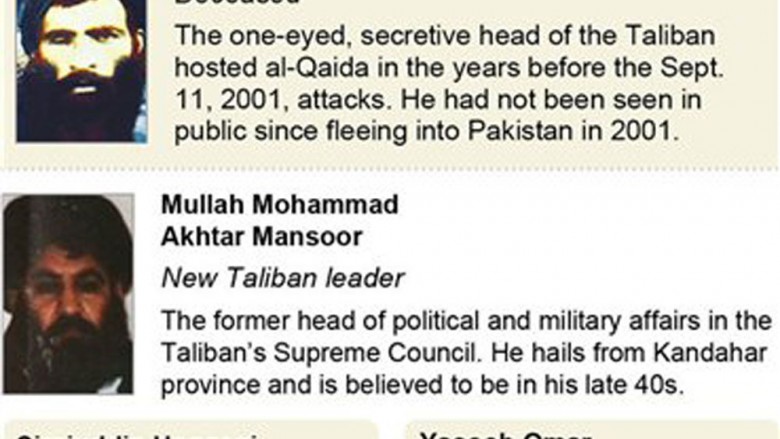Death of Taliban leader roils Afghan politics
By Associated Press | August 2, 2015, 7:56 EDT
 Graphic shows gives some information on the top leaders in the Taliban.
Graphic shows gives some information on the top leaders in the Taliban. Written by Lynne O’Donnell
KABUL, Afghanistan (AP) — The Afghan Taliban has confirmed the death of its reclusive longtime leader, Mullah Mohammad Omar, after the Kabul government reported that he had been dead for more than two years. The move has led to a leadership crisis in the Taliban, as Mullah Omar’s longtime deputy takes the helm over the objection of the former leader’s relatives.
Here’s a look at where things stand:
___
WHAT’S AT STAKE
The previously united front that the Taliban presented to the world has been shattered. Mullah Mohammad Akhtar Mansoor who, according to the Afghan government, has been the Taliban’s shadow leader for years, was elected to succeed Mullah Omar. But Mullah Omar’s son Yacoob has publicly rejected Mansoor’s election and called for a new vote that encompasses all Taliban commanders, including those fighting in Afghanistan. The splintering of the group could see disaffected Taliban fighters and field commanders defect to rival factions such as the Islamic State group — which has been trying to recruit in Afghanistan. Mansoor’s priority in the coming days and weeks will be to consolidate his position.
___
WHAT DOES IT MEAN FOR THE FUTURE OF THE PEACE PROCESS
The future of the nascent peace process is now uncertain. A second round of face-to-face talks in Pakistan has been indefinitely postponed. A statement issued by the Taliban purporting to be a message to the rank and file from Mansoor was an attempt to appease and please all sides — those who favor peace and those who still believe they can overthrow the Kabul government. Most Afghans believe that the Taliban can never make a return to power. But there is concern that President Ashraf Ghani’s government could be compelled to make concessions — especially regarding women’s rights — to bring the war to an end.
___
WHAT DOES IT MEAN FOR AFGHANISTAN
The decision by the Afghan government to announce the death of Mullah Omar appears to have been aimed at discrediting the Taliban by exposing the deception of a small ruling clique that had hidden the fact of Mullah Omar’sdeath from the lower ranks. The current Taliban leadership crisis could give the Afghan government extra leverage in negotiations. The Kabul administration has a chance to take control of a peace process that has been directed by Pakistan under the supervision of China and the United States.
___
WHAT ABOUT THE ISLAMIC STATE GROUP
The rival extremist faction could potentially be the big winner. The Islamic State group already controls about a third of Iraq and Syria, with active affiliates in Egypt, Libya and elsewhere. Afghan government and U.S. military officials say the Islamic State group has established a small presence in Afghanistan and is actively recruiting militants from the Taliban and other factions, offering money and weapons. A large contingent of Taliban loyalists who object to Mansoor’s selection or feel deceived by their leadership over Mullah Omar’s death could immediately bolster the Islamic State group’s ranks in Afghanistan.
Copyright 2015 The Associated Press. All rights reserved. This material may not be published, broadcast, rewritten or redistributed.










